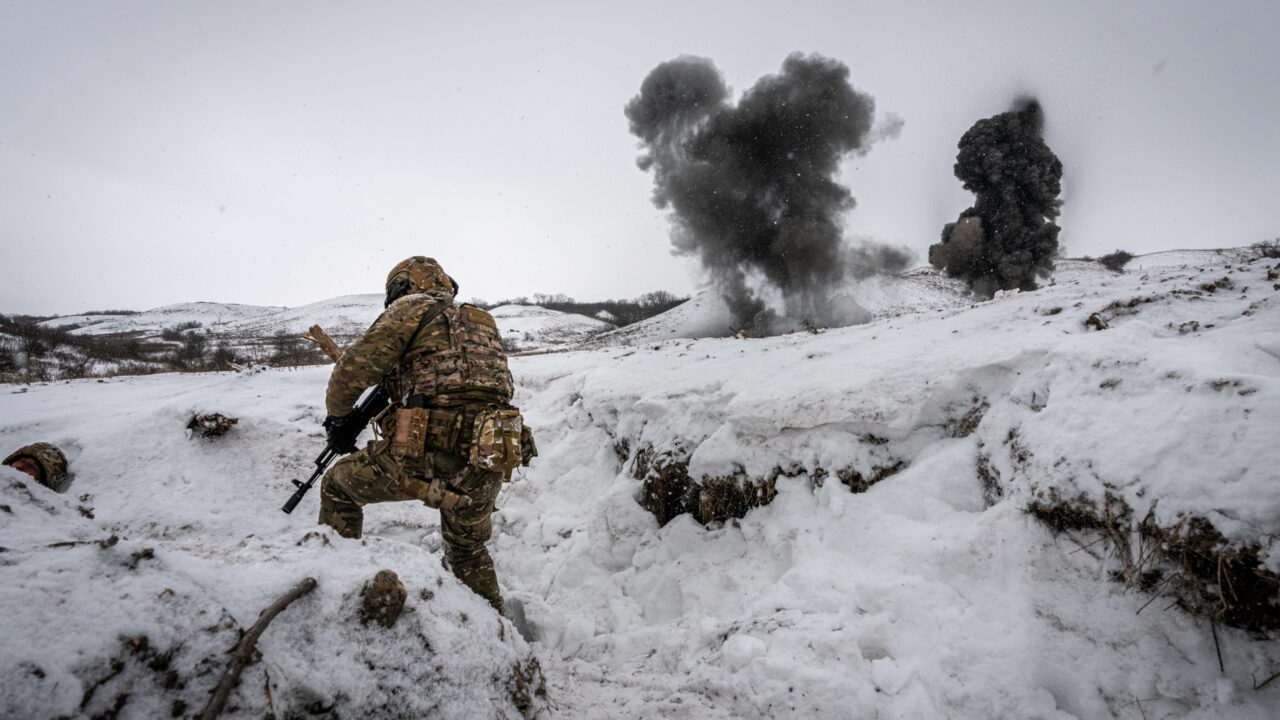A war of wills: Europe’s peace mission in 2024
Russia will continue its war on Ukraine for as long as it can. Europeans need to make it clear that their will to support Kyiv will not falter
Russia’s war on Ukraine will remain the major security challenge for Europe in 2024. As I write this, I follow the reports of missiles and attack drones raining down on the cities of a European country. During the first three days of 2024, Russia launched around 500 missiles and attack drones across Ukraine, aimed at cities, industry, and infrastructure, as part of its sustained effort to subdue the country. It was the biggest wave of such attacks since the aggression started in February nearly two years ago. Looking ahead to 2024, it is clear that Russia will continue to wield its destructive might against Ukraine for as long as it can. To make peace possible, Europeans need to show Putin that their resolve will not soften.
We live in a completely new reality in today’s Europe. Before Vladimir Putin started his war, very few had thought this would be possible. I wrote some years ago that we had entered a new time of troubles; but since then we have entered a time of new dangers. No task is more important for European politics in the years ahead than bringing this war to an end and then starting to take steps towards something that can be called peace in our east – between the Vistula and the Volga.
Let’s be clear: if Putin’s military machine were to succeed in grinding down Ukraine, this would never be able to bring peace. On the contrary, it would most likely take us to another even broader and even more dangerous war. Sooner or later, Putin’s missiles could be raining down on European cities outside Ukraine’s borders too. Not only Kyiv, but also Riga, Warsaw, and Berlin. We would be on the threshold of nuclear war.
In order for peace to be possible, two things are required.
The first is that Putin is no longer in power in the Kremlin. This is his war. It was he, and almost only he, who started it, and he made it abundantly clear at his press conference a few weeks ago that he intends to pursue it until he reaches the goals he has set. These, he stressed, have not changed. With ever harder repression and increasingly brutal propaganda, the Russian people are politically and physically forced to submit. We should take Putin seriously. He means what he says.
Carl von Clausewitz thought that war is about breaking the will of the opponent. But the will of Ukraine will not be broken. The Ukrainians are fighting for their very existence. This war is between the will of the Kremlin and the will of the West.
Putin’s future is determined within the thick walls of the Kremlin and possibly in some of the big buildings around it in Moscow. Right now, his message to everyone in these circles is that the will in the West is faltering, and that in a year we may have Donald Trump back in the White House. Until then, the missiles must continue to rain on Ukraine’s cities and the will of the West must be broken.
Our task – Europe and, hopefully, also the United States and many other countries – is to show that he is wrong and that our will to support Ukraine is firm. It is when that message sinks in – that he cannot win against the West, and that there is no road to victory for Russia – that the will in and around the Kremlin can begin to falter.
This will require many billions in military and financial support, but in relative terms these are small amounts. Europe’s support so far is well below 0.3 per cent of our GDP. We can afford it – and more if required. The cost of failing will over time be much higher.
Europe’s support so far is well below 0.3 per cent of our GDP. We can afford it – and more if required
The second prerequisite for long-term peace is that we help in future-proofing Ukraine. Immediately, this is about helping to build its long-term military defence and deterrent capabilities, and certainly about anchoring it in some way to NATO and its member countries. But at least as important is securing Ukraine’s democracy, legal order, and economy through steps towards EU membership. In this new year, the accession negotiations on this must begin.
In the daily news, the European Union is often about new regulations, muddled meetings, and everlasting discussions. We too often forget that the EU is ultimately the crucial peace project in our part of the world. And that this peace project is now facing a new and extremely demanding phase.
War between France and Germany can be read about in the history books. The EU was formed to keep it there, and it has succeeded. Then it was about anchoring and securing democracy in southern Europe when the dictatorships fell there. It succeeded again. And then it was about giving stability and prosperity to the historically often unstable central Europe when the Soviet empire crashed. Essentially, it has also succeeded in this. Now it is about completing the peace mission in Europe by providing peace and stability to its east. This is a mission for decades, and one that goes well beyond just this war. Success is not obvious – but the alternative is continued war and instability.
In short: either we manage to extend the stability of the West and the centre of Europe to its eastern parts, or its conflicts and instabilities will gradually extend westwards. This is the strategic imperative we must have in focus as we enter this new year.
The European Council on Foreign Relations does not take collective positions. ECFR publications only represent the views of their individual authors.



